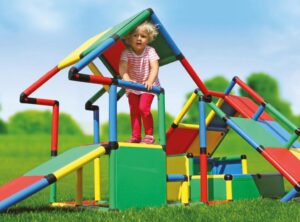
The Association of Play Industries (API) was one of the first to back a call from the All Party Parliamentary Group (APPG) on a Fit & Health Childhood for a holistic strategy from government on child development. API chair Mark Hardy talks about what the APPG’s report recommends for children’s outdoor play and the role of Nannies.
The APPG’S 63-page report covers a host of different aspects of play and play provision but has a single unifying message; that children will always play provided they are given the opportunity to do so.
API chair Mark Hardy said: “We must ask ourselves if our children today have the same or better opportunities to play that we did. If they do not, then we must address that. This report make some strong recommendations, which if followed, will have a positive impact on creating more opportunities for children to play. High quality public play facilities bring innumerable benefits to local communities that reach far beyond simply providing children with a fun place to play”.
The report’s key recommendations for government, backed API is for play to be embedded within a whole-child strategy under the auspices of a cabinet minister for children responsible for cross-department roll out and co-ordination.
Hardy and API commissioned a survey ‘Nowhere to Play’ and 98% of respondents recoginsed the need for children to be more physically active. “That’s fantastic’, says Hardy. “Everyone agrees that it is important, but more than 70% say they are worried that children are spending too much time in front of screens. If you put those two things together, actually it’s common sense and the ability to do something is in our hands”.

A second recommendation is for government to require local authorities to prepare children and young people’s plans including strategies to address overweightness and obesity with its physical, mental and emotional consequences.
“Government makes all the right noises”, says Hardy. “No one is going to turn around and say play is not important, but the reality in the parishes, councils, and schools is a different matter. Everyone is having to make do with less. You can talk a good game, but when it comes to it, shifting play off the agenda is easy to do”.
This is maybe why the group also recommends funding for play to be ring-fenced within local authority budgets and for barriers to outdoor play for children of all ages and abilities to be addressed.
The APPG want to see communication through public information campaigns to parents and families of the value of active outdoor play, including benefit:risk assessment. And Hardy says it is not just parents who have a role to play.
“If you look at play areas on weekdays during term-time, it tends to be childminders, nannies and grandparents who take children [there],” he says. “We would encourage them to get involved in their local parish councils and get their voices heard as they know what is attractive to children to play”.
Hardy is very much of the view “build it and they will come”. He believes in looking at the issue very simplistically. ‘Children play,” he says. “It’s natural. If you create the opportunities, children will play. A field might be standing empty, but once you put a play area in it it will be busy”.
The Association of Play Industries (API) is the trade association of the UK play sector.

